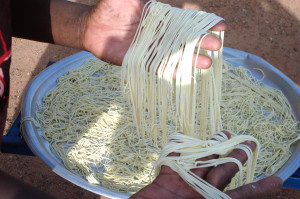Post-Petroleum Food Justice
A few weeks ago I led the prayers of the people at church and invoked the following:
“We pray for all who are oppressed and prisoners of conscience, politics or religion. We especially lift up the long suffering and vulnerable who yearn for the democratic freedoms in North Africa and the Middle East — freedoms that we too often take for granted in sustaining our oil-dependent lifestyles and geo-political prejudices.”
I’ve been reflecting on the “oil-dependent,” if not oil-addicted, nature of our lives. Fossil fuels don’t just run our cars and heat our homes; they are a major ingredient in our industrial food production. As we approach peak oil (when oil production begins to decrease), food prices will go up, impacting disproportionately those who can least afford it. As the Africa partnerships coordinator at KAIROS, I’m mainly concerned about Africans who, having contributed least to global warming, already suffer disproportionate flooding, drought, desertification, conflict and migration as a result of climate change.
I’ve been reading Raj Patel’s The Value of Nothing: Why Everything Costs So Much More Than We Think. Patel mentions a World Bank study concluding that we must shift away from the current industrial system of agriculture as it doesn’t adequately value natural resources. This resonates with the call of the world’s poorest people for “local, ecologically sensitive solutions [to the climate and food crises] that respect local knowledge, democracy and autonomy.” For us, it may mean paying the real costs of consumption—like $200 hamburgers. Many have heard about and some have participated in the proverbial 100 mile diet promoted by KAIROS – perhaps one of our best examples of acting locally while thinking globally.
Jason Bradford of the Post-Carbon Institute recently wrote that “agriculture was created as a primary way civilizations harness the energy that allows them to do work. Now, however, agriculture is simply another fossil fuel conversion system. While these fuels provide us with tremendous labor efficiency, we can no longer say we have an energy efficient way to make food since food production is now an energy sink.”
Yet there are signs of hope. The Ecuadorian government has adopted a constitution that recognizes the rights of nature. Innovative and alternative media are increasingly unveiling the ways governments are directed, if not controlled, by corporate oil and agribusiness interests and power at the expense of the environment, community rights and those least responsible, but most exposed to, environmental degradation. The democratizing peasant movement La Via Campesina, with some 150 million members in 69 countries, has developed the principle of “food sovereignty” – the right of peoples to define their agricultural and food policy, and to protect what is needed to survive: land, water, seed and culture.
Their work brings to mind the plea –and the promise– of Psalm 82:
‘How long will you judge unjustly
and show partiality to the [shameless]?
Give justice to the weak and the orphan;
maintain the right of the lowly and destitute.
Rescue the weak and the needy;
deliver them from the hand of the [shameless].”
Psalm 82:2-4, paraphrased.
Jim Davis, KAIROS Africa Partnerships Coordinator









